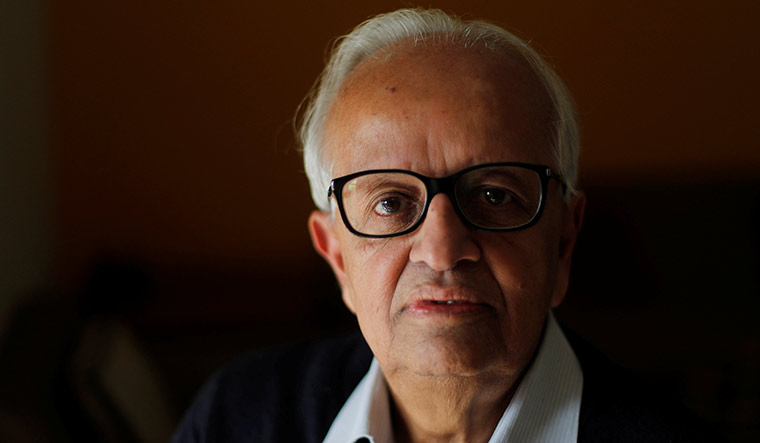WHILE EXPERTS ARE divided on the manner in which the lockdown was imposed across the country after the Covid-19 outbreak, former Reserve Bank governor Bimal Jalan has no doubt that it was the best thing the government could have done. In an exclusive interview with THE WEEK, he talks about why the slowdown might be a temporary one and the measures the government should take to revive the economy. Excerpts:
Many people have opined that the lockdown will severely affect the economy. Do you think it was the best thing to do by the government to resort to a complete lockdown?
There is no doubt at present that the lockdown has affected the growth rate of the economy. According to the estimates made by several economists and experts, the growth rate will significantly decline. Estimates of likely growth rate during this period range from 0.5 to 2 per cent. Hopefully, it will be a short-term issue. The lockdown has ensured that the spread of Covid-19 has been brought down. If the lockdown had not been imposed there would have been many more sick people and many more people would have died. As such I think there would have been no option for the government but to go in for a complete lockdown. I hope that once the lockdown is lifted, growth will revive as the number of affected people has not been very high in India, compared with other countries.
How much growth rate we will actually have in the future is a long-term issue and I feel that after the lockdown ends the growth will start reviving. The government has to take all the necessary action to revive growth as early as feasible. There could be scope for companies to invest more in order to increase demand for their products. The government has already taken some measures and the Reserve Bank has also infused substantial long term liquidity.
Recently, the RBI took steps to infuse liquidity into the system. Is this enough?
So far, the steps taken by the RBI and the government are timely, but whether they are enough would depend on how the Indian economy actually behaves. The RBI has introduced low rate of interest and the government has also increased the fiscal deficit target. These have been broadly aimed at increasing consumer demand and the supply side in the economy. The RBI has taken measures to provide resources to strengthen SMEs as well as mutual funds in addition to reducing lending interest rates.
If more liquidity has to be created by the RBI and the government, it is necessary to take administrative measures and simplify the approval system for those who are investing. Large corporates have to be encouraged to spend as much they can. At the same time, it must be ensured that benefits reach the common people. Under the present situation, we have to implement the measures that have already been announced by the government and the RBI based on actual developments. In the light of these measures, it should be feasible for the government and the RBI to further increase liquidity in the economy, if required.
Will we be able to achieve the target of making India a $5 trillion economy by 2024?
I think we should not stick to the target of $5 trillion economy by 2024. Any target for the economy in 2024, which is four years from now, should be considered only after we mitigate the economic effects of the Covid-19 pandemic. As things stand today, we will not be able to achieve a very high target within the given timeframe as announced earlier. I feel that the present situation will prevail at least for the next two or three quarters. However, if we do not introduce measures that are required to accelerate growth, the effects of Covid-19 on the economy and the welfare of the people will be very challenging. As of now, we are on track and have taken appropriate, timely steps and decisions.
Will the long-term economic reforms that the government had launched be affected by the lockdown?
Confidence among people in terms of investment, and consumer demand and consumption have to improve. At the moment, the government should take short-term action to revive the economy. It should take long-term economic reforms when the present circumstances have turned around and the slow growth rate is revived to at least 5 per cent.
How much time will the economy take to revive post the lockdown?
This year, the GDP growth rate may not be 5.2 or 6 per cent, but over a period of time it can certainly increase if appropriate policy actions are taken. When growth rate increases, employment prospects and jobs will also increase. Under the present circumstances, as rate of growth and investments have come down significantly, jobs have been impacted severely. So we have to reverse the present situation and ensure that more jobs are created in the economy. As mentioned, the government and the RBI should go all out to revive growth and to take measures to bring back the economy to normal.
All necessary action should also be taken on the demand side. The impact assessment of the lockdown is important, but is not a priority issue. It can be accessed after we have taken measures to revive the growth rate. The immediate priority should be to reverse the impact of this pandemic on the Indian economy as early as possible.


